The United States and the ITU: Holding the Multistakeholder Line

More on:
The Plenipotentiary of the United Nation’s International Telecommunications Union (ITU) began this week, and it is likely to be what the Washington Post calls, "the latest battle over who should run the Internet."
Over the next two weeks, the Digital and Cyberspace Policy Program will be publishing a look at some of the strategies and objectives of the of some key player at the ITU. First up is the United States.
The United States heads to the 2014 International Telecommunications Union Plenipotentiary Conference in Busan, South Korea, looking to defend its approach to Internet governance. Washington and its allies favor the "multistakeholder" model: a bottom-up policy process that includes organizations representing technical experts, governments, businesses, civil society, and individual users. On the other side of the discussion are authoritarian states like China and Iran, which see the multistakeholder model as favoring U.S. economic and security interests. They are pushing for greater involvement of multilateral organizations like the ITU. In addition, many developing countries, which often lack independent civil society actors or businesses capable of participating in multistakeholder governance, prefer multilateral organizations like the United Nations, where governments are the primary actors.
The United States’ strategy to defend the open, global Internet is to make the multistakeholder model more transparent and inclusive, preventing further encroachment of multilateral institutions on Internet governance. The challenge for Washington at the plenipotentiary conference is to protect against greater ITU involvement while not alienating potential partners in the developing world whose acceptance of the multistakeholder model is essential to its future.
You can read the rest of the memo here.
More on:
 Online Store
Online Store